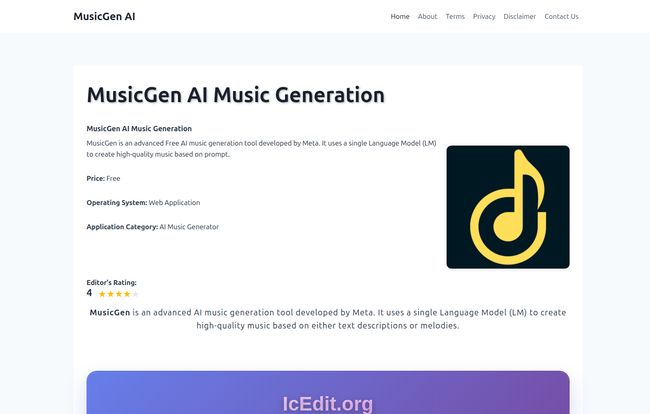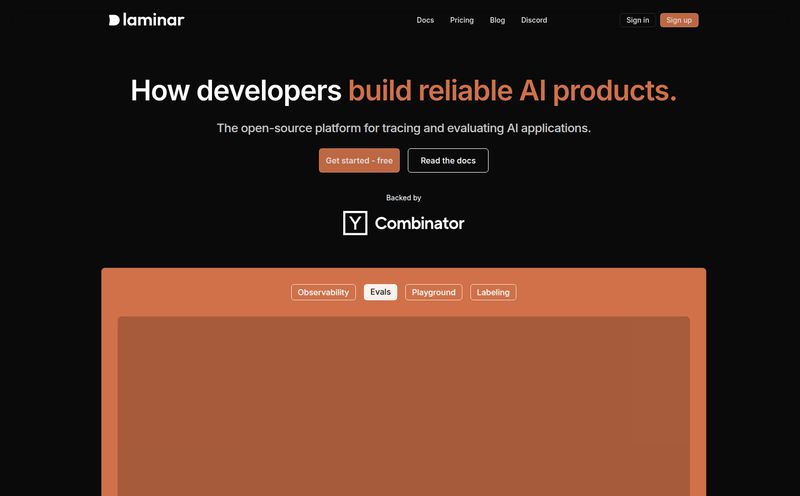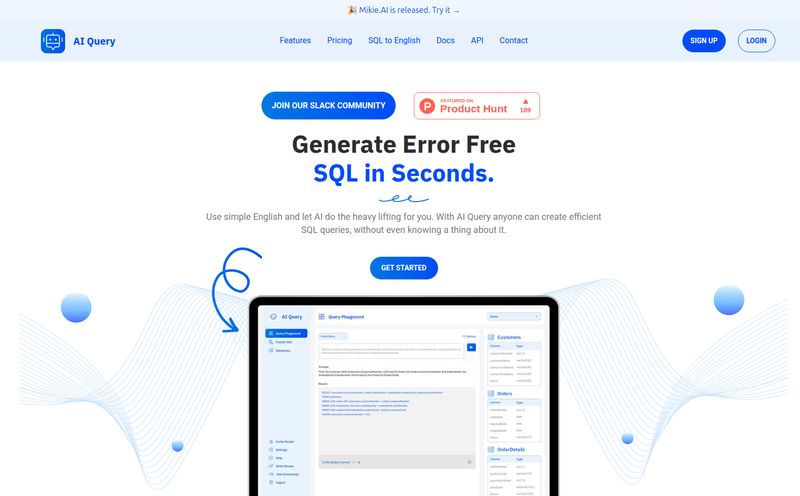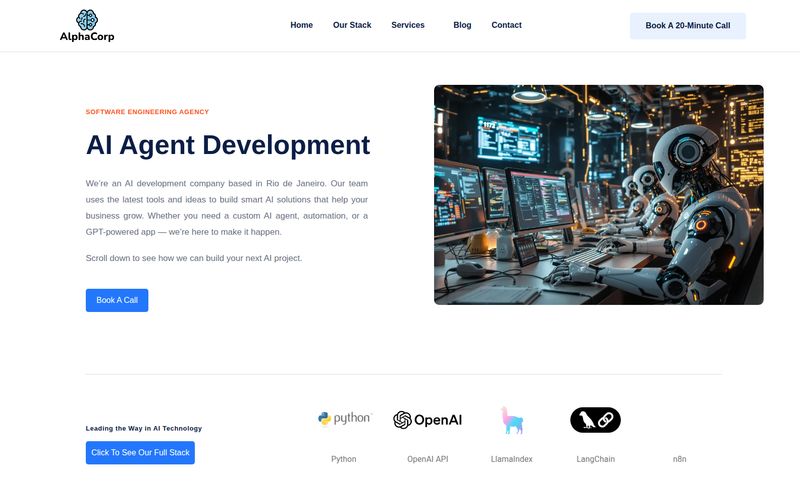I've been in the SEO and digital marketing world for years, and I've seen AI go from a nerdy buzzword to something that... well, pretty much runs everything. We've got AI for writing, for images (hello, Midjourney), and now, the final creative frontier: music. And let me tell you, not all AI music tools are created equal. Some spit out what sounds like generic elevator music, while others... others are genuinely impressive.
Today, I want to talk about one of the big players from a company you might have heard of: Meta. It's called MusicGen, and it's been making some noise (pun absolutely intended) in the creative tech community. So, is it just another robot with a synthesizer, or is there some real artistry here? Let's get into it.

Visit MusicGen AI
So, What Is MusicGen, Really?
At its core, MusicGen is an AI model designed to create music. You give it a push, and it gives you a song. Simple, right? But the way it does it is what's interesting. Meta built it on a single Language Model (LM), which is a bit different from some other approaches that juggle multiple models. Think of it less like a committee trying to write a song and more like a single, very talented (and very fast) musician who can absorb your ideas and turn them into sound.
You can guide it with a text description—a prompt—like
a sad, slow blues track with a prominent piano melody," or you can even hum a tune into your mic and have it build a whole arrangement around your idea. It's this flexibility that first caught my attention. It's not just a music vending machine; it feels more like a creative partner.How Does This AI Magic Actually Work?
Without putting on a lab coat and getting too technical, MusicGen works by predicting the next 'token' of audio, much like a text-based AI like ChatGPT predicts the next word in a sentence. It was trained on a massive amount of licensed music, learning the patterns, structures, and relationships between notes, instruments, and rhythms.
The two main ways you interact with it are:
- Text-to-Music: You write a detailed prompt describing the vibe, genre, instruments, and tempo you're after. The more descriptive you are, the better the result.
- Audio-to-Music (or Melody Conditioning): This is the cool part, in my opinion. You can provide a snippet of existing audio or a melody, and MusicGen will use that as a creative jumping-off point, ensuring the generated track is harmonically and rhythmically aligned with your input. It’s like saying to a band, “Here’s a riff, can you build a song around it?”
Visit MusicGen AI The Good Stuff About MusicGen
Every tool has its shiny parts, and MusicGen has a few that really stand out. First off, its versatility is a huge plus. It’s not a one-trick pony. I’ve thrown prompts for everything from 8-bit video game music to epic orchestral scores, and it generally whips up something interesting. The quality of the generated audio is surprisingly high, avoiding that compressed, muddy sound that plagued earlier AI music tools.
Another thing I appreciate is the level of control. You can adjust parameters to fine-tune the output, which is great for anyone who wants to do more than just press a button and hope for the best. And perhaps most importantly, its accessible. Meta has made it available on platforms like Hugging Face, so you don't need a supercomputer or a PhD in machine learning to try it out. That's a big win for democratization of this tech.
Where It Gets A Bit Tricky
Now, it’s not all sunshine and symphonies. One of the biggest hurdles is its complexity, especially if you want to go beyond the simple web demos. Looking at the instructions for a local installation (which I saw on a community site), you're talking about setting up Python environments with Conda, cloning repositories from GitHub, and downloading massive model files. It's totally doable for a developer, but for your average content creator or musician, it’s a steep climb. It reminds me a bit of the early days of setting up a personal web server – powerful, but not exactly plug-and-play.
The other point to remember is that it's data-dependent. The old saying “garbage in, garbage out” is truer than ever. The quality of its output is entirely dependent on the data it was trained on. While Meta used a huge dataset, you might find it struggles with super niche or obscure genres. It knows what it knows.
Visit MusicGen AI Getting Your Hands Dirty With MusicGen
So you want to give it a spin? You've basically got two paths, and they're pretty different.
The Easy Way on Hugging Face
For 99% of people, this is the way to go. Hugging Face is a platform that hosts a ton of AI models, and they have a public demo for MusicGen. You just go to the page, type in your prompt, maybe upload a reference audio file, and hit generate. It's simple, it's free (though there might be a queue), and it gives you a fantastic feel for what the tool can do without any technical fuss. This is how I'd suggest most people start.
The DIY Route with a Local Install
This is the power-user option. If you're a developer, a researcher, or just someone who loves to tinker, you can install MusicGen on your own machine. This gives you way more control, no queues, and the ability to integrate it into your own projects. But as I mentioned, it's a process. You'll be working in the command line, managing dependencies, and you'll need a decent computer with a good GPU to run it efficiently. It offers maximum freedom but demands technical know-how in return.
What About the Cost? The MusicGen Price Tag
This is often the first question I get about new AI tools. Here’s the good news: MusicGen is an open-source model. Meta released the code and the pre-trained models for free, primarily for research purposes. This means you can download it and run it yourself without paying any licensing fees to Meta.
Using the demo on a platform like Hugging Face is also typically free. The only “cost” you might encounter is if you decide to run it on powerful cloud servers (like AWS or Google Cloud), in which case you’d be paying for the computing time. But for most users, you can experiment with MusicGen without ever opening your wallet.
Visit MusicGen AI Frequently Asked Questions About MusicGen
Is music from MusicGen copyright free?
This is a gray area. The music it generates is original, but the model was trained on copyrighted works. Meta's license for the model is generally permissive for research but has restrictions for commercial use. Always check the latest license terms from Meta and consult a legal expert before using AI-generated music in a commercial project. It's better to be safe than sorry.
How does MusicGen compare to other AI tools like Suno or Udio?
MusicGen is more of a foundational model, excelling at creating instrumental tracks and loops from detailed prompts. Tools like Suno and Udio have become incredibly popular because they integrate AI-generated vocals and have a more 'finished song' feel right out of the box. MusicGen is arguably more of a musician's or producer's tool for creating stems and ideas, while Suno and Udio are aimed at generating complete songs, lyrics and all.
Do I need to be a programmer to use MusicGen?
Not at all! If you use the web-based demos available on platforms like Hugging Face, it’s as simple as typing in a text box. You only need programming skills if you want to install and run the model on your own computer for more advanced applications.
What's the best way to write a prompt for MusicGen?
Be specific and descriptive! Don't just say "rock song." Say "High-energy 90s alternative rock song with a distorted guitar riff, fast-paced drums, and a driving bassline, upbeat and energetic." Mention genres, instruments, tempo (e.g., 120 bpm), and mood (e.g., melancholic, joyful). The more detail you provide, the better MusicGen can understand your vision.
Can MusicGen create vocals or lyrics?
The base MusicGen model is focused on instrumental music generation. It does not generate lyrics or sung vocals. Some other models and platforms have built upon this kind of tech to add vocals, but that's not a core feature of MusicGen itself.
Final Thoughts: Is MusicGen a Hit?
So, what's the verdict? I think MusicGen is a genuinely powerful and important tool in the AI music space. It's not a magic 'make-a-hit-song' button. It's more like a new kind of instrument. For producers, composers, and content creators needing background music, it’s an incredible resource for sparking ideas and generating high-quality instrumental tracks.
The open-source nature of it is its biggest strength and, in a way, its biggest weakness for non-techy users. While the public demos are great, its true power is a bit locked away behind a command-line interface. Still, as a peek into the future of music creation, it's absolutely fascinating. It proves that AI can be more than just a novelty; it can be a legitimate creative collaborator.
References and Sources



